Why is my blood pressure high at night when it is normal in the morning? What should I do?
Fluctuations in blood pressure are regulated by changes in our body's biological clock, and usually we need higher blood pressure during the day to maintain our normal daytime activity level, so the vast majority of people have higher blood pressure during the day than at night.
Characteristics of blood pressure fluctuations
During the 24 hours of the day, our blood pressure fluctuates all the time, but in general there is a "double peaks and valleys", that is, around 6:00 to 10:00 in the morning blood pressure gradually rises to reach the highest peak of the whole day, and then gradually decreases. Around 4:00-6:00 p.m., the blood pressure gradually rises again and reaches a peak, but usually does not exceed the peak in the morning, and then the blood pressure gradually decreases again and reaches the lowest value of the whole day around 2:00-3:00 a.m. The fluctuation of blood pressure throughout the day ranges from 20% to 20%. Throughout the day, blood pressure fluctuates between 20 and 30 mmHg. This is the blood pressure fluctuation characteristic of most people.
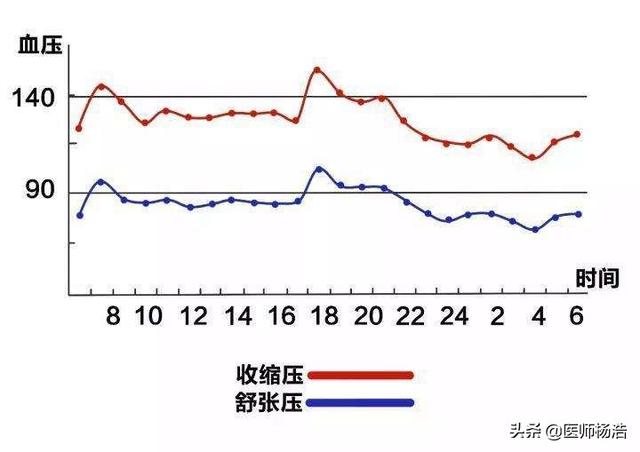
So, in general, the average blood pressure at night is lower than that during the day, and if the average blood pressure at night is 10% to 20% lower than that during the day, we call it aArytenoid blood pressure; if the average blood pressure at night is as much as 20% or more lower than during the day, we call it adeep-pocket blood pressure; if the average blood pressure at night is not as much as 10% lower than during the day, we call thisNon-pryoidal blood pressure; if the average blood pressure is higher at night than during the day, we call it aAntipyrine blood pressure.. Most people's blood pressure is of the arytenoid type, and a small percentage of people have other types of blood pressure. To find out exactly which type of blood pressure you have, you can have 24-hour ambulatory blood pressure monitoring to clarify.
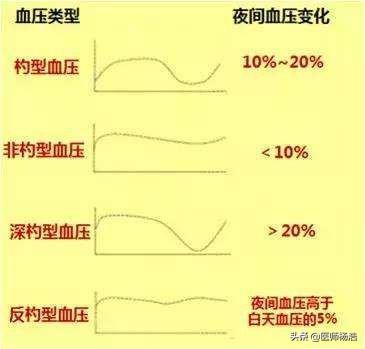
So why do you have normal blood pressure in the morning and high blood pressure at night?
This is more common in older peopleThis is because the elderly have a reduced ability to regulate their blood pressure and are susceptible to changes in body position, meals, mood or temperature. In fact, abnormal blood pressure fluctuations such as hyperpyrexia and nonpyrexia are also more common in the elderly. In addition.People who often stay up late, have poor nighttime sleep, and have combined sleep apnea syndromeIt may also lead to disturbances in blood pressure regulation. Abnormal fluctuations in blood pressure are more likely to occur in damage to target organs such as the heart, brain and kidneys. This requires a rational choice of medication for different types of hypertensive patients.
For patients with elevated blood pressure at night, first of all, we need to clarify what causes their blood pressure to rise at night, whether it is due to poor sleep quality, combined with sleep apnea syndrome or a decline in the ability to regulate their own blood pressure, and then target these causes for treatment. If it is their own blood pressure regulation ability decline caused by the night blood pressure rise, we through the need to adjust the antihypertensive drugs, choose to take antihypertensive drugs in the afternoon, if the blood pressure rise in the early morning, usually choose to take in the bedtime with medium, short-acting antihypertensive drugs.
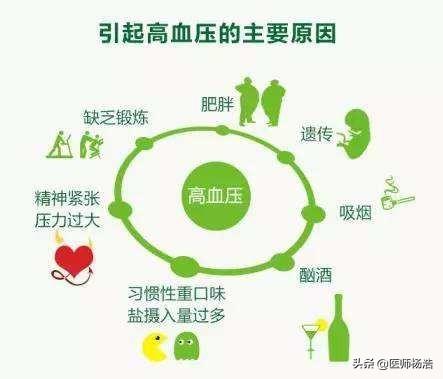
I am physician Yang Hao, specializing in the diagnosis and treatment of common and multiple diseases, chronic disease management, health science. Welcome to like, forward, leave a message, pay attention to this headline, let you live a healthier life!
Thanks to Goku for the invite!
Normal people's blood pressure has rhythmic, 6-10 am and evening 5-8 pm blood pressure is slightly higher, 0-3 am blood pressure gradually drop to the trough, the so-called "double peaks and valleys". However, some hypertensive patients not only do not reduce their blood pressure at night, but also exceed the daytime blood pressure, we call this type of blood pressure "anti-spoon type blood pressure".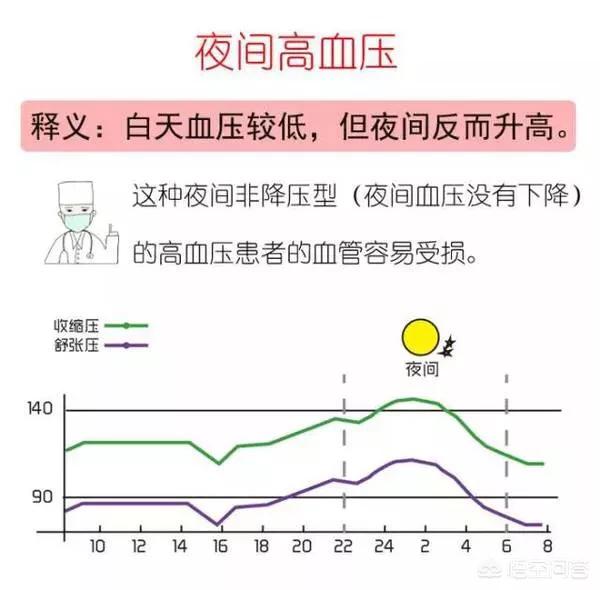 Anti-spoon type blood pressure accounts for about 25% of hypertensive patients. The reason why the blood pressure at night is higher than that during the day is related to the increased sympathetic nerve activity, which increases renin secretion and, through a series of physiological reactions, raises the blood pressure at night. Most patients with anti-scoop blood pressure have organic pathologies, such as cardiac insufficiency and renal insufficiency, leading to fluid retention; some patients may also have respiratory obstruction, such as caused by snoring during sleep.
Anti-spoon type blood pressure accounts for about 25% of hypertensive patients. The reason why the blood pressure at night is higher than that during the day is related to the increased sympathetic nerve activity, which increases renin secretion and, through a series of physiological reactions, raises the blood pressure at night. Most patients with anti-scoop blood pressure have organic pathologies, such as cardiac insufficiency and renal insufficiency, leading to fluid retention; some patients may also have respiratory obstruction, such as caused by snoring during sleep.
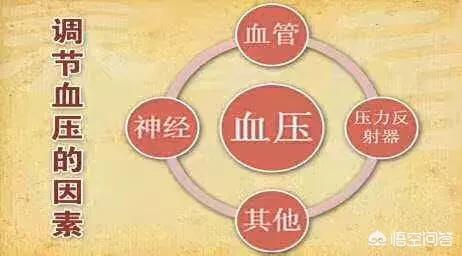
What is the treatment for people with anti-spoonage blood pressure?
(a) First of all, we should consult the doctor in time to rule out whether there is any combination of organic pathology. If there are other diseases at the same time, timely treatment can not only prevent the disease itself from aggravating, and achieve early detection and early treatment, but also enable the blood pressure to be controlled to a certain extent.
(ii) Antihypertensive treatment. It has been found that anti-scoop blood pressure is more likely to damage blood vessels, which can cause several target organ damages, and it is necessary to control blood pressure in the normal range to reduce target organ damages. Commonly used drugs include ACEI (e.g., enalapril, benazepril, etc.), ARB (e.g., chlorsartan, irbesartan), etc. It is recommended to use drugs under the guidance of a specialist. Secondly, you should also improve your lifestyle, low-salt diet, quit smoking and limit alcohol, stay up late, avoid exertion, keep a calm mind, etc., which is more conducive to the control of blood pressure.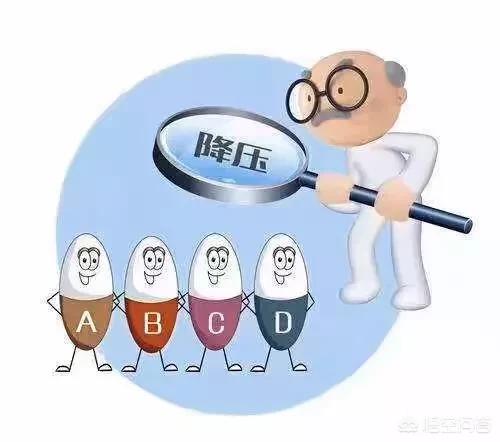 Thanks for reading and good luck with your health!
Thanks for reading and good luck with your health!
Thanks for the invitation to explain ''Why is my blood pressure high at night when it is normal in the morning? What should be the treatment''?
The problem is this, when people go to sleep at night, the cerebral cortex rests, the heart rate slows down, the resistance of blood vessels decreases, the body's endocrine hormones are reduced, the metabolism is slow, and the blood stays in the blood vessels and internal organs and tissues, therefore, the blood pressure is smooth, together with the effect of antihypertensive medication on the first day, so the blood pressure is basically not high.
However, when people get up and start activities, eating and other factors, heart rate increases, blood flow increases, blood vessel contraction, endocrine system secretion of hormones increase and other reasons, blood pressure into a parabolic rise. Therefore, the blood pressure will open this rise after 8:00 a.m. Therefore, patients suffering from hypertension should start taking antihypertensive drugs every day in the morning to prevent the blood pressure from rising. It is best to take long-acting controlled-release tablets to keep your blood pressure steady throughout the day!
My explanation is for your reference!
This situation of normal daytime blood pressure and high blood pressure at night may belong to the non-spoon type of blood pressure, which is more prone to cardiovascular and cerebrovascular events, and should be adjusted to the time of antihypertensive medication.
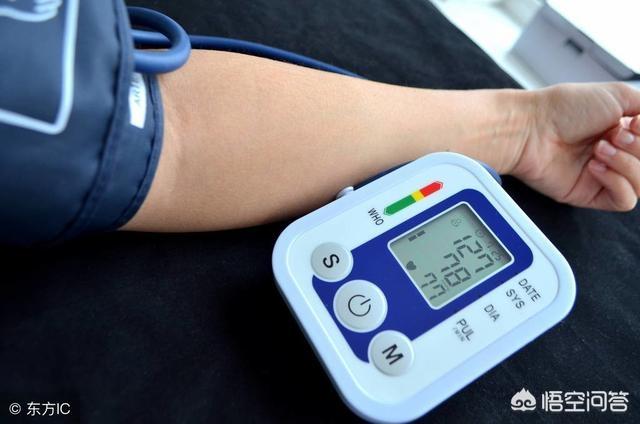
First of all, most of our blood pressure fluctuates in two peaks and one trough: blood pressure starts to rise at 6:00~9:00 am, forming the first peak, and then starts to fall until 4:00~6:00 pm to form the second peak again, and then at 0:00~2:00 pm late at night the blood pressure is lowest, forming the trough, and the blood pressure at night is 10%~20% lower than the peak during the daytime, which is the spoon type blood pressure. If the nighttime blood pressure is <10% or >20% lower than the daytime peak, the blood pressure is non-scooped, and the subject's elevated nighttime blood pressure is non-scooped. Non-scoopers may have more target organ damage and cardiovascular events, and must keep their nocturnal blood pressure under ideal control. Unlike spoon hypertensives who take oral antihypertensive drugs in the morning, non-spoon hypertensives should take their antihypertensive drugs at night so that the peak plasma concentration of antihypertensive drugs is basically synchronized with the peak of blood pressure to achieve better antihypertensive effect.
So in the case of the subject, a 24-hour ambulatory blood pressure assessment should be done first, and if it is indeed a non-spoonful type of blood pressure, the duration of antihypertensive medication should be adjusted.
Blood pressure is one of the main indicators of the health of our body, the body's blood pressure is in the process of constant dynamic change, for the vast majority of the population, our body's blood pressure exists "two peaks and one valley", that is, early in the morning from 6 to 10 o'clock in the morning and 16 to 20 o'clock in the afternoon for the day's blood pressure peak, and at night from 0 to 2 o'clock for the trough of the blood pressure, also known as the "spoon type blood pressure". This is also known as "spoon blood pressure".
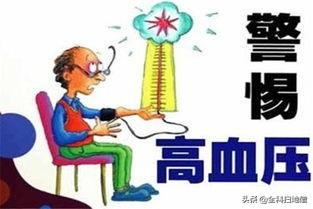
However, in our daily life, we will also meet a few people, their blood pressure during the daytime is often normal, but at night the blood pressure will rise, this kind of nighttime blood pressure increase in the population, also known as the "anti-spoon type blood pressure". When our blood pressure rises, we should consult a doctor in time to find out whether there is a possibility of hypertension. Hypertension can be diagnosed when our systolic blood pressure is ≥140mmHg and/or diastolic blood pressure is ≥90mmHg three times in non-same day without taking antihypertensive drugs.
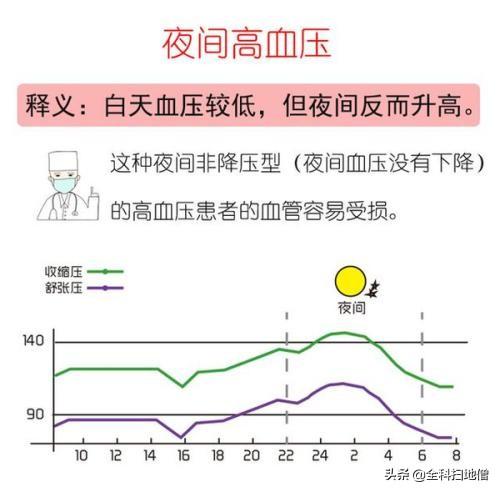
Once diagnosed, hypertension should actively improve lifestyle, low-salt diet, control daily sodium intake of less than 6g is appropriate; to quit smoking and alcohol, need to strictly quit smoking, the best not to drink, difficult to quit alcohol must be strictly limited to the amount and frequency; to appropriate exercise, to aerobic exercise, talking about gradual and orderly progress; also want to control body weight, obesity attention to weight loss; and at the same time, to maintain a good state of mind and regular work and rest.
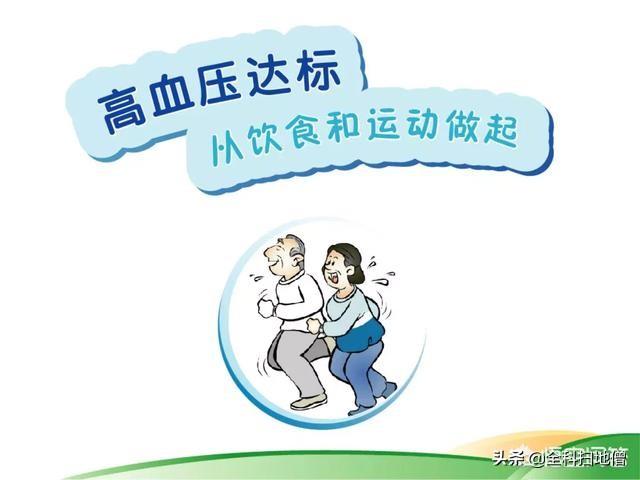
While improving our lifestyle, we should also pay attention to the rational use of blood pressure-lowering drugs under the guidance of a doctor. Long-acting preparations are recommended for long-term stable blood pressure lowering, and afternoon medication may be considered for those with predominantly nocturnal blood pressure elevation. We should also pay attention to monitoring the change of blood pressure level and regular rechecking while regular treatment in order to stabilize and control the condition.
This article is answered by General Practice Sweeper, we hope that it will be helpful to you, copyright ©️, reproduced with permission. Please correct any deficiencies. The article is for reference only and is not intended as medical advice or medical guidance.
Thank you for inviting, normal blood pressure is, high pressure 120, low pressure 80, below this number higher than this number, so are not normal, high blood pressure trip, a variety of factors, generally in the morning, blood pressure will fluctuate, should go to the hospital, ask the doctor, the doctor give you to adjust a little, antihypertensive drugs can not be eaten casually, if it is really high blood pressure, no need to be afraid of, more rest, mood relaxation, not anxious, not angry, more than one, eat fruits and vegetables, celery, onions have the effect of lowering blood lipids and lowering blood pressure, so that blood pressure can be stabilized. Eat fruits and vegetables, celery and green onions have the effect of lowering blood fat and blood pressure, so that blood pressure can be stabilized, three parts of the medication and seven parts, I wish you good health.
Thanks for the invitation! I have a history of high blood pressure for over thirty years. General night sleep the whole body to get enough rest human blood flow slow and steady, blood pressure will naturally come down. Therefore, in the morning, blood pressure performance is generally not too high. Along with the increase in the amount of activity blood supply demand increases, blood pressure will gradually rise. Therefore, insist on taking hypertension control or vasodilator drugs become very necessary. We old hypertensive patients to follow the doctor's advice is to be lifelong on time to take high blood pressure medication. When the blood pressure rises in time to take drugs to control can effectively prevent and control the probability of cardiovascular and cerebrovascular accidents.
Nocturnal hypertension
Normal blood pressure in the morning and high blood pressure at night is nocturnal hypertension. Usually referred to as elevated blood pressure between 10 p.m. on the first day and 6 p.m. on the second day, nocturnal hypertension is a type of hypertension, or a symptomatic feature. Blood pressure changes in healthy people show a low at night and a high during the day, and the fluctuations of blood pressure in many hypertensive patients also show this characteristic, with an upward trend from 6:00 a.m. to 10:00 a.m., followed by a slow decline, with a small peak at 14:00 to 16:00 a.m.
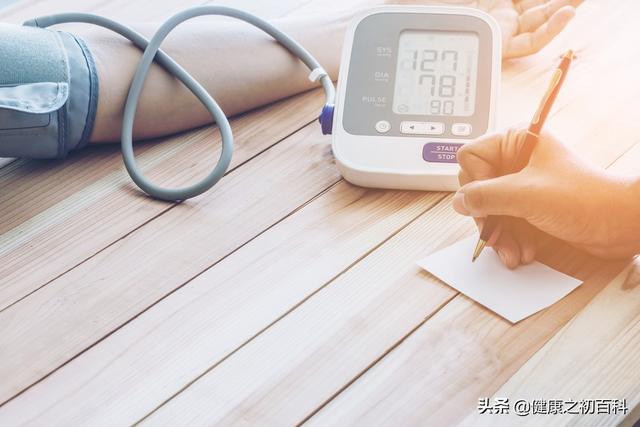
Therefore, in general, waking up early in the morning is the devilish time of the day for hypertensive patients, a period when the blood pressure itself rises, and the body's transition from a state of lying down to an active state can lead to cardiovascular events induced by the sudden rise in blood pressure.
Nocturnal hypertension is more insidious, more harmful
However, there is a group of patients who have normal blood pressure in the morning and high blood pressure at night. Because it is easier to monitor blood pressure levels during the day, daytime hypertension is more likely to be detected and treated, whereas nocturnal hypertension can only be detected by 24-hour ambulatory blood pressure monitoring.
Nocturnal hypertension is more closely associated with target organ damage to the heart, brain, and kidneys, and a study of 1,542 hypertensive patients followed for 9.2 years found that both non-spoonful (high nocturnal blood pressure) normotension and hypertension significantly increased the risk of cardiovascular death, and that the risk of death from nocturnal hypertension was 5.37 times higher than that of those with normotension.
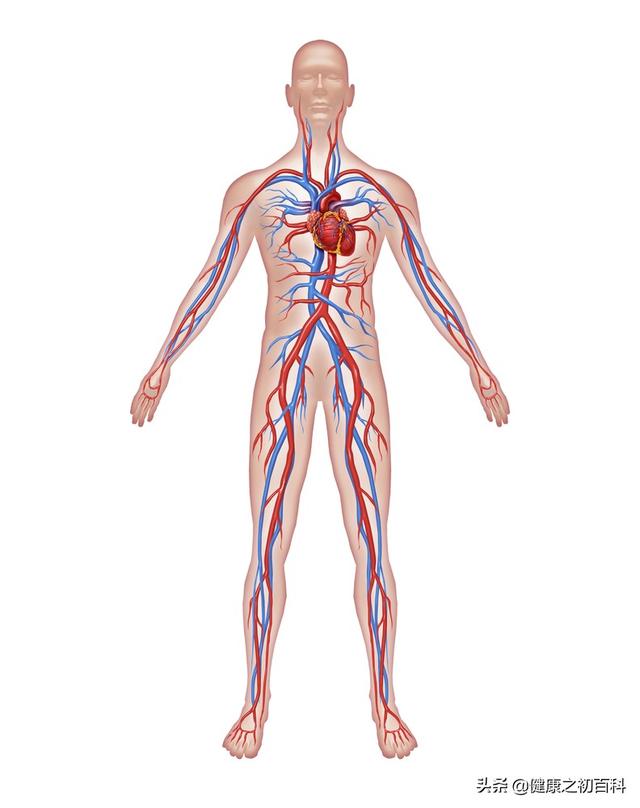
Patients with nocturnal hypertension are more likely to develop atherosclerosis, kidney damage, myocardial remodeling, and myocardial fibrosis.
How to control nocturnal hypertension
1. Adjusting the timing of medication
You can adjust the timing of the medication to just before bedtime or around dinner so that the peak of the medication's effect is similar to or consistent with the peak of your blood pressure.
2、Dynamic monitoring of blood pressure to develop a personalized drug plan
Regardless of whether it is nocturnal hypertension or not, it is recommended that hypertensive patients monitor their blood pressure dynamically for 24 hours to get a full picture of the changes in blood pressure, and formulate a personalized medication regimen based on the high and low levels of blood pressure and the pattern of change.
3、Regular work and rest
Staying up late can lead to increased blood pressure and metabolic rate at night and decreased blood pressure and metabolic rate during the day, exacerbating nocturnal hypertension. A regular routine and good quality of sleep can help control nighttime hypertension.
4. Strict lifestyle interventions
Control the intake of salt, sugar, liquor, fatty meats and other foods that tend to raise blood pressure, and conduct strict lifestyle interventions for hypertensive patients.
Thank you for the invitation, first of all, I am not a doctor, I do not know medicine, can be counted as a patient experience, the year before last, I turned from low blood pressure into secondary hypertension, began to insist on serving antihypertensive and lipid-lowering drugs, so far control is relatively smooth, the doctor told the whole day blood pressure fluctuations up and down at different times, seasonal different also have up and down fluctuations, this is a normal phenomenon, if the fluctuations are too large, should be adjusted to the measurement, or in the afternoon to add a small measure of antihypertensive drugs. The effect is obvious. My fluctuations are controlled within 20. It is best to consult a physician for diagnosis and treatment.
First of all, let me state that I have never studied medicine, but I have heard from insiders that if blood pressure is high in the morning, it is caused by blood stickiness and hardening of the blood vessels. If the blood pressure is elevated at noon, this is something I can't think of offhand what causes it. If the blood pressure is high in the afternoon and at night, I guess there is something wrong with the kidneys. If you have this phenomenon, you should go to the hospital to check if the high blood pressure is caused by kidney problems.
I am only suggesting this and my advice is for informational purposes only!
This question and answer are from the site users, does not represent the position of the site, such as infringement, please contact the administrator to delete.